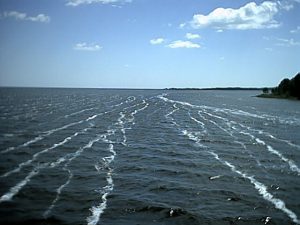

Become a Student of The Weather – Part 2 of the interview that I did on the subject of weather and how it affects your sailing with Professional Sailor and International Sailing Coach Andrew Palfrey.
Do you take notice of the clouds on the course and how do they affect your decision-making?
Yes, absolutely. I think broadly speaking, the clouds can tell you a lot about whether the forecast is playing out, or not. This assumes you had that information to hand prior to racing.
What can Clouds tell you?
Lots but to highlight a couple of things that I look for:
- In terms of a sea-breeze development, they are fundamental in highlighting the convection above the land
- On a day of squally and rainy conditions, the clouds are your main indicators for where to go and where to avoid going.
- The approach of a change in conditions (be it a tightening of pressure gradient, a front etc..).
- Basically, they are part of the environment in which we make our decisions
If the wind shift seems persistent how do you establish a new mean or is this a constant process? Become a Student of The Weather
The mean is something we set in our minds, so of course, it is quite a fluid number. Keeping an open mind and constantly updating what is happening and where we are relative to course and laylines is key.
How do you calculate wind strength in order to set your boat up for the conditions?
I think the keys here are:
- What is the sea-state?
- How dense does the breeze feel on the sail plan?
- Are the waves offset to the True Wind Direction?
- I’ll try to get a quick feel for these questions in the first couple of minutes in a pre-race line-up. Set the boat up and adjust as necessary using your senses. Then check in with performance relative to other boats and make some simple evaluations based upon your power level and balance
If a front is predicted during the race, does your strategy take this into account?
Yes – you’d be constantly monitoring the sky and the True Wind Speed and True Wind Direction.
If you feel a sudden change in temperature either up or down, what can you read in to this?
Tricky one… we all feel when the wind becomes warmer when sailing toward land on a summer’s day in an offshore breeze or the colder air filling in when a sea-breeze starts to build.
Hard to generalise what this means. Sometimes it is obvious, like the examples here. Other times it can be quite subtle.
But I think it is another indicator that things have just changed and you need to be tuned into what it might mean and how it affects your decision-making in the short term.
What effect can a rain squall moving across the course have and how can you use it to your advantage?
If the squall is generally upwind, I’d be aiming to place the boat near to the leading edge of the rain squall. But not so close that I get engulfed too quickly relative to the fleet.
In general, you will find more breeze and shifted direction on the edge. If the rain squall is downwind of the gradient True Wind Direction, I’d try to get away from it as quickly as I could (or try to avoid it if you are sailing downwind).
In this case, the colder air coming from the cloud would generally reduce the True Wind Speed.
Do you time shifts to get an idea of when to expect the next shift or is it something that you feel?
I’ve never really taken the times of shifts methodically like that and I do not write the shift range down I seem to have a good recall for the numbers.
Where is the best place to get your weather information from? Become a Student of The Weather
I have developed a trust in Predictwind. Very user-friendly. Gives a good overview snapshot, but allows you to dig deeper into the bigger picture synoptic and cloud situation with a few clicks. I like it.
Do you look at a weather map and what do you read from it?
Yes – I think it important for sailors to know what is driving the weather and what are the 2 or 3 biggest influencing factors. This helps over the course of an event.
I just like to know what is driving the wind we see and how might that change over the course of the day or the event, I think it is just another component in developing your decision-making instincts.
More articles at Sailing To Win

